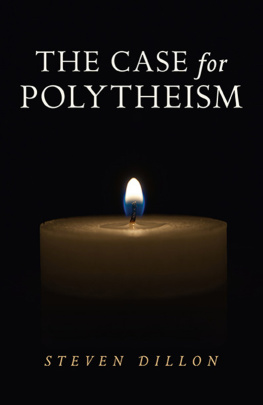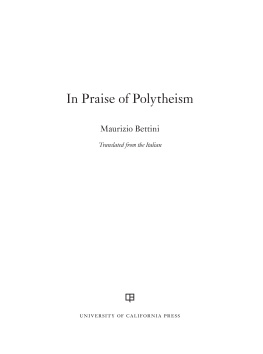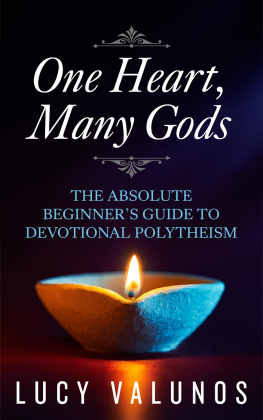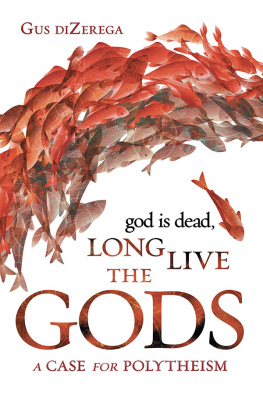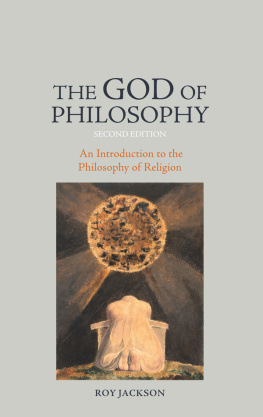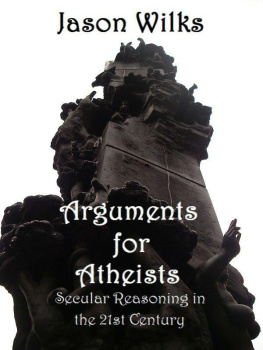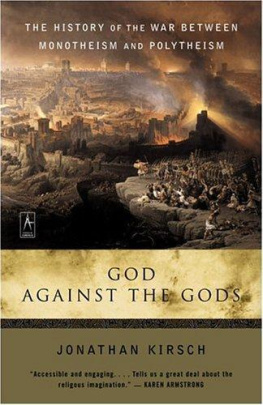WHAT PEOPLE ARE SAYING ABOUT
THE CASE FOR POLYTHEISM
Gentle and respectful, and at the same time rigorously logical, Dillons argument shows why philosophers, theologians, and thinking people of all kinds, should take polytheism seriously. If future generations say that pagan philosophers made a comeback in the 21st century, they shall say Dillon was among the first, and among the best.
Brendan Myers, author of The Earth, The Gods, and The Soul: A History of Pagan Philosophy
For centuries now, most discussions of deity in the Western world have pretended that the only available choices are one god or none at all, in an attempt to erase the oldest and most widely embraced option in world religions polytheism, belief in many gods. Steven Dillons new study The Case for Polytheism is a thoughtful and incisive exploration of polytheist belief as a live option for modern people.
John Michael Greer, author of A World Full of Gods: An Inquiry into Polytheism
First published by iff Books, 2015
iff Books is an imprint of John Hunt Publishing Ltd., Laurel House, Station Approach,
Alresford, Hants, SO24 9JH, UK
www.johnhuntpublishing.com
www.iff-books.com
For distributor details and how to order please visit the Ordering section on our website.
Text copyright: Steven Dillon 2014
ISBN: 978 1 78279 735 7
All rights reserved. Except for brief quotations in critical articles or reviews, no part of this book may be reproduced in any manner without prior written permission from the publishers.
The rights of Steven Dillon as author have been asserted in accordance with the Copyright,
Designs and Patents Act 1988.
A CIP catalogue record for this book is available from the British Library.
Design: Lee Nash
Printed and bound by CPI Group (UK) Ltd, Croydon, CR0 4YY
We operate a distinctive and ethical publishing philosophy in all areas of our business, from our global network of authors to production and worldwide distribution.
CONTENTS
Acknowledgments
This book has been several years in the making and I am grateful to everyone who has encouraged me to continue and taken the time to read drafts as well as share insights. In particular Andrew Johnson, whose style of philosophy I have tried to emulate ever since encountering it, and my wife, whose feedback and support have been invaluable to me.
I dedicate this book to Lune: youve always been the only proof Ive ever needed.
Chapter 1
What is a God?
Preliminary Thoughts
Yes, home they went, and all things beautiful,
All things high they took with them,
All colours, all the sounds of life,
And for us remained only the de-souled Word.
Torn out of the time-flood, they hover,
Saved, on the heights of Pindus.
What shall live immortal in song
In life is bound to go under.
This is the final stanza of The Gods of Greece by Friedrich von Schiller, who in excellent romanticist fashion mourns the death of the gods and the world they represented, slain by reason or the de-souled Word. This seems to embody a common sentiment nowadays: human reason has decommissioned many ancient ideas, and polytheism is one of them.
But from the time I first read this, my mind revolted against it. The polytheism of ancient paganism implied a world full of mystery and adventure, and struck me as interesting and beautiful. Yet I simply could not bring myself to believe it. In fact, I sincerely albeit begrudgingly thought it was false, and even studied to be a Catholic priest for a few years. I could only dream about being pagan at this point in my life. However, the time sometimes comes when our minds are seized and directed in unpredictable ways, and that time came for me with neither haste nor delay.
The following investigation is an exercise in natural theology. A natural theology is just a systematic attempt to prove or show
For centuries now natural theology has been dominated by monotheists. Whether arguing from the apparently fine-tuned initial conditions of the universe for intelligent life, the remarkable specified complexity of the cell, or practically any other phenomena physical, moral or conceptual the arguments marshaled by theists have been almost exclusively intended to motivate monotheism.
Polytheism, which once held the place of prominence in natural theology, has thus been sorely neglected. On the one hand, this kindles an eagerness for a renaissance in polytheist philosophy. On the other hand, however, there is urgency for caution, as conclusions may only be seen to be premature after the discussion has developed.
Bearing this in mind, a natural theology is still a very important component of a theists philosophical worldview, others include a developed opinion on what morality concerns, the nature of the mind and what knowledge consists in. As fascinating as it would be to construct (or at least defend) distinctively polytheist positions in these and related fields, I must reserve our attention for natural theology in this project.
It will not particularly matter whether the polytheist is Christian, Jewish or Pagan, the philosophical foundation I intend to lay will be able to support many different forms of polytheism. However, in the interests of full disclosure, I should let the reader know that I am a pagan, and will try to keep my biases in check.
In claiming that this natural theology is a philosophical foundation, I do not mean to comment on what role arguments ought to play in belief formation. Perhaps the appropriate (or even exclusive) means of attaining deeply seated belief in the gods is experience rather than reasoning. Whatever the case, the question before us is what reasons there are to believe that gods exist, not what role reasons ought to play in discerning whether gods exist.
My hope is that this work will help inspire thoughtful individuals to discuss and reevaluate the merits or demerits of polytheism.
Godhood
Lets begin by developing a working understanding of what gods might be like. With that in hand, we can then turn to discussing whether any gods exist, and if so, how many.
Fortunately, we dont have to start from scratch as if the concept of a god had never even crossed someones mind before. On the contrary, we have handfuls of paradigmatic examples to draw from. However, these examples can differ to such an extent that it is difficult to find the common denominator between them that explains why they are gods instead of something else. For example, some might be completely disembodied, others composed of rock or sea, some remarkably benevolent, and others just downright nasty.
But our inability to uncover the individually necessary and jointly sufficient conditions of godhood is nothing to call home over. Like any other cluster of concepts correlated through a family resemblance, we only need a description that is recognizable as that of a god. For example, one way to tell whether something should count as a god or not is to compare it with our paradigmatic examples of deities. If it resembles them in the sense and to the extent that they resemble each other as gods, we should recognize it as a god.
But I want to take an easier though no less effective route. By using a selection of our paradigmatic examples of gods, I propose the following three conditions as sufficient for godhood:
(i): Disembodied consciousness

